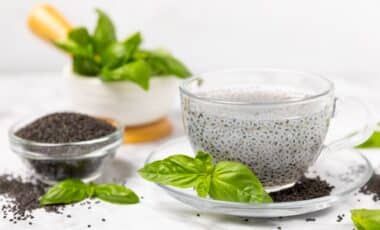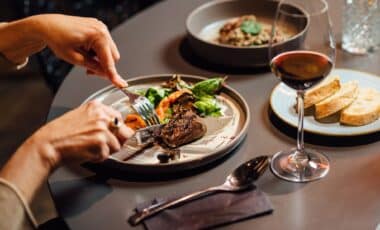
We begin our exploration of vegan and vegetarian options in the City of Angels at the Mandarin Oriental Bangkok. The five-star hotel made a big statement about its culinary direction last year, releasing for the first time ever a vegan and gluten-free afternoon tea set in September, just in time for the 10-day Jay vegetarian festival. Not just a gesture for Jay week, however, the afternoon tea set has remained a permanent offering at The Authors’ Lounge, as with other newly invented vegan and vegetarian dishes in the Mandarin Oriental’s other highly acclaimed dining venues, including Lord Jim’s and The Verandah.
The man responsible for the meatless implementations is the hotel’s seasoned executive chef Dominique Bugnand, whose overall vision for the F&B service is to return to a time of more conscious cooking. “Growing up in Burgundy, my grandfather had a farm where we would source our ingredients. We knew where everything came from and how it was grown. Everything was organic. When I started my career 40 years ago, chefs were still very conscious about where their ingredients came from. We would never order any meat or vegetable from a different region. We would take only from local producers. Things have obviously changed over the last couple of decades with globalisation and mass production, but I believe that the philosophy I grew up with is now coming back,” he says.
 Mandarin Oriental’s vegan afternoon tea set
Mandarin Oriental’s vegan afternoon tea set  Chef Dominique Bugnand is behind Mandarin Oriental Bangkok’s plant-based creations
Chef Dominique Bugnand is behind Mandarin Oriental Bangkok’s plant-based creations
It is clearly also what the customers are demanding and health is a big concern. “There are diseases linked to animals and we also have more allergies and stress than we’ve ever had, and it’s because of what we eat. As I’m getting older, I too have reduced my meat intake for my health,” the chef explains. “Working in the kitchen is the most beautiful job in the world, but it is one of the harder ones. Chefs have to be healthy to keep up with the long hours and the stress and for our longevity.”
Practising what he preaches, Bugnand has encouraged nearly all his peers at the hotel to eat a more plant-based diet, even challenging a few of them to do it for a week. He does this not only for their well-being but because, as the Oriental plans to roll out more vegan and vegetarian options, it is a chef’s cardinal rule to serve only what one would eat oneself.
Another hotel that made headway last fall for going green is the Grand Hyatt Erawan. In September 2019 it hosted the launch of Green Monday, a social venture promoting environmental sustainability and a plant-based lifestyle, in Bangkok. Invested in the movement, the hotel has upgraded each of its menus to include more permanent vegan and vegetarian options. It also launched a successful pop-up food truck serving vegan curry wursts and burgers made of Beyond Meat and took it to last year’s Wonderfruit festival, where it sold out.
See also: Wonderfruit 2019: The What, The Why, The Reason You Should Go
 Chef David Senia, Grand Hyatt Erawan’s new executive chef, caters to all customers’ dietary needs
Chef David Senia, Grand Hyatt Erawan’s new executive chef, caters to all customers’ dietary needs
Initiated by former executive chef Markus Zuck, David Senia now takes the wheel in navigating the Grand Hyatt into a new decade of conscious cuisine. Like Bugnand at the Mandarin Oriental, Senia grew up on a farm—this time in the South of France near Nice—and he eagerly discusses agriculture’s role in cuisine and in the global trend of eating less meat. “The way meat and animal products are produced today is not the same as it was half a century ago. In fact, even since the time I became a chef 30 years ago, I have noticed the change. Chicken, eggs, beef—they don’t react the same way in the pan and it’s because the animals aren’t being fed and grown in the same way. Today’s livestock are ‘superanimals’, so it’s no surprise to me that more and more people, in order to be more healthy, are turning to vegetarian and vegan diets.”
Aware of the sophistication of the customers walking through the doors of the Grand Hyatt, Senia is committed to creating more plant-based meals that can bridge the gap in taste and appearance, a challenging task that requires a lot of time, trial and innovation. “At the end of the day, if you work in a five-star hotel like this, the main thing we do here is to care. We care about our customers, their health and their dietary needs, and we care about what we serve on a plate. This philosophy is the common ground I believe the Hyatt has with the vegan spirit.”
Related: Ready For Change: David Yeung Launches Green Monday In Thailand
Caring indeed seems to be the key ingredient to going successfully vegan-friendly, as we discover from another executive chef, Stefan Leitner of the Peninsula Bangkok. “I travel quite a lot and I take notice of the hotels I stay at,” Leitner says. “One of the observations I have from my travels is how sad it is when plant-based offerings on a breakfast buffet, say, are found in a small ‘health corner’ at the back. I came back from a trip and decided that we needed to go in the opposite direction and showcase healthy food, vegan food, gluten-free food and put superfoods front and centre.”
It took the Peninsula six weeks to develop its new vegan-friendly breakfast buffet and the time and effort definitely paid off. Being the first and only five-star hotel in Bangkok to represent vegans loudly and proudly in such a way certainly got the attention of guests. “They have come up to me and said ‘We’ve never seen anything like this here. This is something you’d expect to see in boutique hotels in California, but in Thailand and even Hong Kong we’ve never seen this before.’ It validated what we believed and motivated us to increase our vegan offerings,” says Leitner.
 The Peninsula’s Stefan Leitner says plant-based food has to be Instagrammable
The Peninsula’s Stefan Leitner says plant-based food has to be Instagrammable
No matter where you are in the Peninsula Bangkok today—the lobby, the Chinese restaurant, in your room or at the pool—a vegan meal is just an order away. “I was actually a bit skeptical about having vegan food at the pool, whether or not there would be a demand there, but people like to be healthy at the pool as well it seems,” the chef laughs. Interestingly, he adds that it is the older generation so far that is embracing the Peninsula’s plant-based offerings. “People want to live longer and it is now widely accepted that there’s a correlation between eating plant-based foods and better health.”
That said, the younger generation has more knowledge than anyone else on this topic and Leitner seems to have just the right strategy for pulling in the youth. “When it comes to vegan food, not only do the flavours have to be spot on, the dish also has to look very appealing. If you go back to the 1990s and 2000s, vegan and vegetarian food didn’t look sexy at all. Today, everything has to look Instagrammable. It has to look fresh, colours are very important and then, of course it must have the texture and taste to match.”
When it comes to vegan food, not only do the flavours have to be spot on, the dish also has to look very appealing. If you go back to the 1990s and 2000s, vegan and vegetarian food didn’t look sexy at all. Today, everything has to look Instagrammable. It has to look fresh, colours are very important and then, of course it must have the texture and taste to match.
— Stefan Leitner, executive chef of The Peninsula Bangkok
 The Peninsula Bangkok’s smoked cauliflower steak
The Peninsula Bangkok’s smoked cauliflower steak  An OmniMeat springroll
An OmniMeat springroll
In terms of standalone vegan restaurants in Bangkok, Veganerie is the city’s staple. Opened six years ago—seven if you include its farmer’s market pop-ups—the business is run by Napaphatsorn Totienchai, or Jajah, a passionate baker who followed in her mother’s footsteps of turning vegan prior to opening her first restaurant. She is proud to have put the word vegan on the map in Bangkok with her swiftly expanding restaurant chain. “Before we opened back in 2014 you didn’t have this concept here, only jay or mungsawirat, the Thai words for Chinese veganism and vegetarian, which tend to connote an entirely different dining experience than the one you’ll find at Veganerie,” Jajah explains.
Jay or mungsawirat tends to elicit images of sacrificing, of Buddhism and merit-making and of overly salty and unappetising food. At Veganerie, however, you’ll find trendy groups of friends laughing and catching up over colourful pastries and beverages. You’ll also often see fitness junkies and athletes there, marked by their yoga pants and running shoes, indulging after a work-out or fuelling for one ahead. There are also families, in many cases dragged in by the younger generation, trying magical dishes that contain no meat, no egg, no milk or anything else derived from animals.
See also: 4 Local Comfort Foods To Indulge In Without Guilt
 “Jajah” Napaphatsorn Totienchai, founder of Veganerie
“Jajah” Napaphatsorn Totienchai, founder of Veganerie
“It personally gives me joy to see families dine at my restaurant and especially to see the older generation open up to it because it was definitely just the younger crowd before,” says Jajah. Many of Veganerie’s loyal fans come from the expat community, but Jajah has observed that in the last couple of years the number of Thai customers has been rising and fast. “They account for 30 per cent of our customers and that number is growing.”
Breaking down Veganerie’s clientele further, amongst the expatriate patrons vegans make up the largest group. However, amongst Thais, non-vegans are definitely Veganerie’s biggest customers and this is what Jajah defines as success. But if you really want to know whether or not Veganerie is a success, you only need to see what the 26-year-old vegan entrepreneur is up to now. “I just returned from Oman where I was invited by Anantara to develop the vegan menu.” Besides travelling the world to share her expertise on vegan cuisine and managing six branches of Veganerie in Bangkok, she is also branching out into the world of social media influence, on which she offers a positive perspective. “I think not only news and the media have helped spread awareness of veganism, but communities are also important to this movement. Just look at the Instagram tag #vegan: it can make someone feel they’re not alone when they eat vegan and that really helps drive a movement quickly,” she says.
Looking to the future, Jajah hopes to see Veganerie expand to other countries and for other vegan brands and businesses to emerge. “There are so many plant-based startups now, even in Thailand. If you go to the supermarket these days, there are even plant-based milks and you can find vegan yoghurts, cheese and meats. I’d be happy to see more vegan businesses opening up, even other vegan restaurants. I don’t feel like it’s competition. It’s more like we’re the vegan Avengers, helping to build the community together,” she laughs.
I think not only news and the media have helped spread awareness of veganism, but communities are also important to this movement. Just look at the Instagram tag #vegan: it can make someone feel they’re not alone when they eat vegan and that really helps drive a movement quickly.
— Napaphatsorn Totienchai, founder of Veganerie
Within the community that Jajah cites is Broccoli Revolution. Opened in 2016, it was the first vegan venture of veteran restaurateur Naya Ehrlich-Adam and her co-founders. “After 15 years away, I returned to Bangkok to live here with my family and I decided that for my next restaurant, I want to do something that didn’t involve meat or animal products,” says Naya looking back to four years ago. Originally, she had in mind a health-oriented juice bar, but on settling at Broccoli Revolution’s flagship Sukhumvit location, it became necessary to think bigger than just juice. The restaurant started out with a couple of vegan dishes alongside the fresh-pressed juice and soon realised that customers were coming for the food. Before they knew it, Broccoli Revolution had become one of Bangkok’s household names for modern vegan dining.
 Broccoli Revolution’s three founders—Krongkan, Naya and Sakson—at their Charoenkrung branch
Broccoli Revolution’s three founders—Krongkan, Naya and Sakson—at their Charoenkrung branch
“The reason I named the restaurant Revolution is because I wanted to change the image that eating vegetarian and vegan was something the old generation did. Vegan can be cool. It is cool! It’s fun and is definitely not boring,” Naya says. The interiors of Broccoli Revolution, especially at the latest branch at Charoenkrung, help to convey this message. The new kid on the old soi of Charoenkrung 42/1, Broccoli Revolution’s storefront slants inward with bold lettering, leading you into a minimalist, zen garden-like atmosphere. Trees grow inside the humble space, which is opened up by skylights and whitewashed walls. —
Like Veganerie, at least 70 per cent of Broccoli Revolution’s patrons are expats and likewise the founders are observing that their Thai clientele is growing, especially amongst a younger age group. “Young people are more health-conscious. They understand more about ingredients and the negative effects of processed food,” says Broccoli co-founder Sakson Rouypirom. “Before, Thais would come in asking ‘what’s not too difficult to eat?’ Now, they recognise our food as another healthy option, so we’re really helping to build awareness about vegan food amongst the Thai community.”
Sakson, who you might know as the man behind local youth non-profit Sati Foundation, is responsible for Broccoli’s social entrepreneurship, another element of its revolution. Integrating Sati with Broccoli, one of the restaurant’s core values is to source ingredients from small, organic farms, which isn’t typically the most convenient or profitable option for a business. Broccoli also engages in Sati’s organic mushroom programme, which donates mushroom germs to at-risk youth for the opportunity to grow and sell them to businesses such as Broccoli. In addition, Broccoli sources its few but delicious vegan baked goods from Steps for Theera, an organisation with a similar soul as Sati that offers opportunities for special needs individuals.
“We felt that with opening a vegan restaurant, it was important to practise social consciousness. It represents an awareness for your surroundings,” says Sakson. He, Naya and their third partner, Krongkan Penpanich, hope to spread Broccoli’s philosophy of kinder, healthier and more sustainable living based on personal experience. “Four years ago I still ate meat,” explains Naya. “But as I ran my business and started to eat vegan every day, I realised the improvements in my health. Everything was better. I come from a cancer-prone family. I’ve been plant-based for three years now and have avoided what could have been the first stage of cancer. I feel so energised, alive and healthy at 48, so I really believe in what I’m selling.”
Related: My First Year On A Plant-Based Diet






